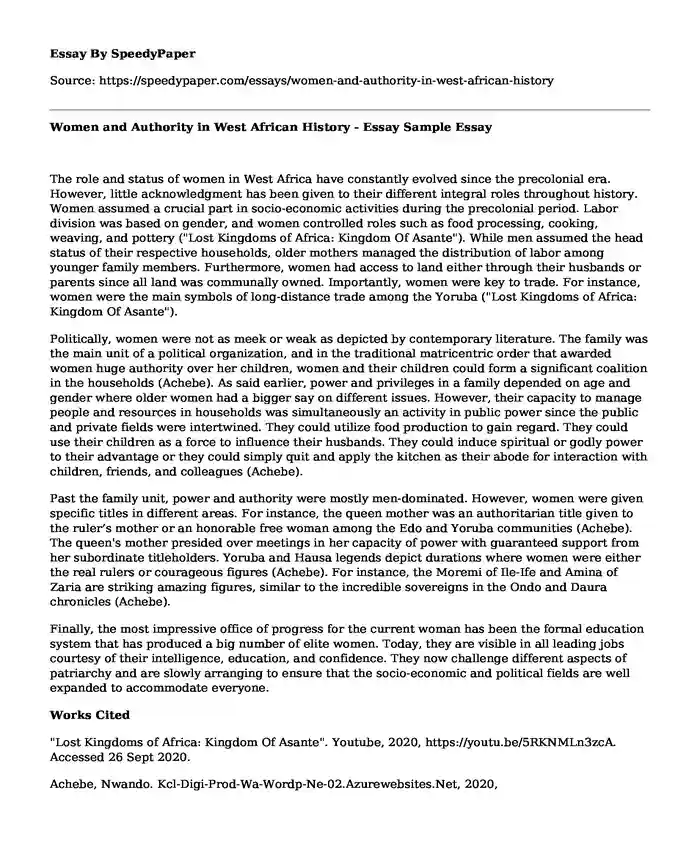The role and status of women in West Africa have constantly evolved since the precolonial era. However, little acknowledgment has been given to their different integral roles throughout history. Women assumed a crucial part in socio-economic activities during the precolonial period. Labor division was based on gender, and women controlled roles such as food processing, cooking, weaving, and pottery ("Lost Kingdoms of Africa: Kingdom Of Asante"). While men assumed the head status of their respective households, older mothers managed the distribution of labor among younger family members. Furthermore, women had access to land either through their husbands or parents since all land was communally owned. Importantly, women were key to trade. For instance, women were the main symbols of long-distance trade among the Yoruba ("Lost Kingdoms of Africa: Kingdom Of Asante").
Politically, women were not as meek or weak as depicted by contemporary literature. The family was the main unit of a political organization, and in the traditional matricentric order that awarded women huge authority over her children, women and their children could form a significant coalition in the households (Achebe). As said earlier, power and privileges in a family depended on age and gender where older women had a bigger say on different issues. However, their capacity to manage people and resources in households was simultaneously an activity in public power since the public and private fields were intertwined. They could utilize food production to gain regard. They could use their children as a force to influence their husbands. They could induce spiritual or godly power to their advantage or they could simply quit and apply the kitchen as their abode for interaction with children, friends, and colleagues (Achebe).
Past the family unit, power and authority were mostly men-dominated. However, women were given specific titles in different areas. For instance, the queen mother was an authoritarian title given to the ruler’s mother or an honorable free woman among the Edo and Yoruba communities (Achebe). The queen's mother presided over meetings in her capacity of power with guaranteed support from her subordinate titleholders. Yoruba and Hausa legends depict durations where women were either the real rulers or courageous figures (Achebe). For instance, the Moremi of Ile-Ife and Amina of Zaria are striking amazing figures, similar to the incredible sovereigns in the Ondo and Daura chronicles (Achebe).
Finally, the most impressive office of progress for the current woman has been the formal education system that has produced a big number of elite women. Today, they are visible in all leading jobs courtesy of their intelligence, education, and confidence. They now challenge different aspects of patriarchy and are slowly arranging to ensure that the socio-economic and political fields are well expanded to accommodate everyone.
Works Cited
"Lost Kingdoms of Africa: Kingdom Of Asante". Youtube, 2020, https://youtu.be/5RKNMLn3zcA. Accessed 26 Sept 2020.
Achebe, Nwando. Kcl-Digi-Prod-Wa-Wordp-Ne-02.Azurewebsites.Net, 2020, http://kcl-digi-prod-wa-wordp-ne-02.azurewebsites.net/westafrican/wp-content/uploads/sites/334/2018/03/11-women-and-authority.pdf. Accessed 26 Sept 2020.
Cite this page
Women and Authority in West African History - Essay Sample. (2023, Dec 28). Retrieved from https://speedypaper.com/essays/women-and-authority-in-west-african-history
Request Removal
If you are the original author of this essay and no longer wish to have it published on the SpeedyPaper website, please click below to request its removal:
- Free Essay Explaining How Punctuality and Attendance Relates to Character
- Interview with a Youth Worker. Free Essay for You.
- Free Essay Example in HRM: Hiring Mistakes
- Free Essay: The Path to Successful Change at a Manufacturing Company
- Essay Sample on Culture or Climate in the WorkPlace
- Paper Example. The Civil Rights Movements History
- Essay Sample on Public Service Leadership
Popular categories





